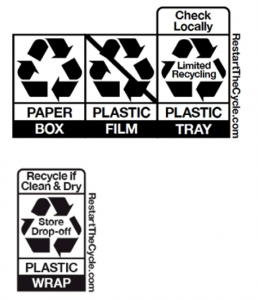In our previous post, “Recycling Obstacles and Tips for Recycling Success“, we discussed one of the biggest challenges to recycling is determining what is recyclable due to lack of consistent standards in labeling products.

The Sustainable Packaging Coalition (SPC) is an industry working group that is committed to creating and implementing an environmental vision for packaging. Their mission is to advocate and communicate a vision for making packaging more environmentally friendly. SPC has been working on a new project and they are preparing to launch a voluntary labeling pilot program for packaging that intends to increase recycling and make it easier to understand. The hope is to eliminate confusion that is caused by some labels. SPC will allow members to use this new labeling program, the How2Recycle Label, on their products, and plans on opening the program to others. The overall goal of this program is for it to become a universal label.
Eco labeling has taken some heat recently because it can be confusing and misleading. Some companies that greenwash use eco labels to make their products appear to be eco-friendly. This has led to consumer confusion and frustration. Consumers want instruction and direction on what is actually recyclable. This pilot labeling program will help give consumers the right information on what to recycle, with the goal of keeping everyone on the same page.
The labels have three classifications: widely recycled, not recyclable, and limited recycling. A black diagonal line will classify the not recyclable label. Limited recycling will have the phrase check locally above the icon and it will identify the material. Plastic bags and films will be classified by store drop off or recycle if clean and dry. Establishing eco labeling standards such as these will go a long way to helping consumers to recycle more waste.
About Pratt Industries & Recycling
Pratt Industries recycles a wide range of materials which are collected in our Residential, Community, School and Commercial and Industrial recycling programs. The paper and corrugated products collected from these recycling programs are used as raw materials for our three paper mills — and returned in the form of sustainable, 100% recycled content packaging for your community.
We accept a variety of recyclable materials including all types of paper, newspapers, magazines, catalogs, office paper, books, corrugated cardboard and mail. Additionally, we accept LDPE film, PET and steel banding, pallets, plastic containers (# 1-7 as well as other types of plastics), aluminum cans, steel cans and glass.